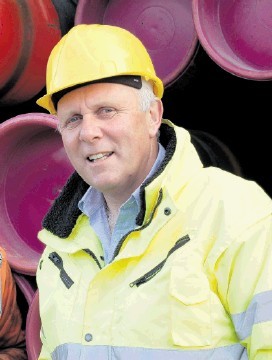
As the latest exploration campaign winds down and preparations for the Austral Christmas begin, at least one leading light in the Falkland Islands business community is pacing the floor.
Lewis Clifton is managing director of Byron Marine and has played a pivotal role in getting the Falklands oil and gas adventure to where it is today by being a force for change.
But he is worried that the next time drillers turn up aboard perhaps as many as three rigs during 2014, the UK possession’s government will be caught out . . . ill-prepared for the huge demand that will be placed on infrastructure and resources, especially port facilities and water.
He particularly views the sudden leap from an interim expansion of the existing interim FIPASS port facilities at Stanley to a full-out £1.7billion oil services facility at Port William a dozen or so miles away as ill-considered.
The earliest that Port William can be ready might be 2016 or 2017, at the time that final preparations are being made to bring the Sea Lion oilfield into production.
“The absolute critical pathway at the moment is for the Falkland Islands Government to begin facing the reality of its decision to build at Port William and not extend FIPASS,” he told Energy.
“The decision to select Port William doesn’t begin to bridge the requirements for the recommencement of the Premier campaign, which will be a mix of appraisal and exploration actively starting in 2014.
“Not only is the port a critical issue in terms of what the operators are looking or, but also to maintain the port to a steady-state for all of the other users in the Falklands, which means tourism, fishing, research vessels, seismic vessels and others.
“For the oil boats there’s also a need for proper infrastructure on the shore to be ready to meet the deadline that Premier wishes to meet.”
If Noble with Falklands Oil & Gas and Edison decide to drill in 2014 . . . and Noble has the clout to make this possible it seems . . . then a third rig will arrive off the islands and require services.
“Noble seems very keen to get on with drilling, so the port is critical,” warned Clifton.
He said that when the government invited stakeholders and users to a meeting last month in the town hall, it resembled a fait accompli founded on inadequate consideration.
“They’ve ruled out extending FIPASS completely. I think FIPASS will become the ghost that will haunt them. It is the only facility that can be naturally used to support Premier’s and Noble’s campaigns.”
Clifton, whose company provided support base services throughout the most recent drilling campaigns, argues that a 200m permanent facility should in any case replace FIPASS as it approaches its natural end.
“To me that would have been the most sensible decision for the wider nation state, not least the smaller cruise ships, which consistently use Stanley. Their passengers want to see Port Stanley and not Port William.”
The Falkland Islands Floating Interim Port & Storage System is one of the legacy projects of the Falklands War.
Turning to the water issue, Clifton indicated this was a huge problem.
“A two-rig campaign would not have been possible given the dryness of the last few summers and winters. Water was being rationed during the final stages of the Ocean Guardian campaign and, for the Leiv Eiriksson, the water was being drawn from ponds in abandoned quarries.
In contrast, Clifton said the Falklands private sector had indeed stepped up to the plate to help enable the exploration programmes to go ahead.
“So many have rolled up their sleeves and got on with things. Now the government needs to come better on side.
“Regrettably, it took two years to wake up to the Sea Lion discovery and its now trying to make up for lost time. That’s difficult.”